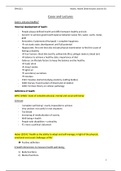EPH1021 Health, Health Determinants and the EU
Cases and Lectures
Case 1: Are you healthy?
Historical development of health:
- People always defined health and differ between healthy and sick
- Ancient: to achieve good health balance between wood, fire, water, earth, metal,
god)
- Aristoteles: Eudaimonia (final goal) = complete happiness
not static state; development until full potential
- Hippocrates: first one that also include physical examination to find the cause of
feeling unhealthy
four humors: black bile (earth), yellow bile (fire), phlegm (water), blood (air)
- balance to achieve a healthy state; importance of diet
- Galenus: six lifestyle factors to keep the balance and be healthy
food/ drink
sleep/ awake
light/ air
secretions/ excretions
Emotion
- 1543: Vesalius started studying anatomy (cutting bodies)
- 1628: Harvey: found system of blood and circulation
- 1858: Virchow theory on cellular pathology
Definitions of health:
WHO (1948): ‘state of complete physical, mental and social well-being’
Criticism:
- ‘complete well-being’: nearly impossible to achieve
- Very unclear: not useful in real situations
- Too broad
- Increasing of medicalization of society
- Well-being ≠ health
- People with disabilities = unhealthy
- It’s more a political statement
Huber (2014): ‘Health as the ability to adapt and self-manage, in light of the physical,
emotional and social challenges of life’
Positive definition
6 health dimensions to measure health well-being:
1) Body functions
2) Mental functions
1
,EPH1021 Health, Health Determinants and the EU
3) Spiritual dimension
4) Quality of life
5) Social participation
6) Daily functioning
Criticism:
- Ambiguity: health is a complex and dynamic concept <-> reduction to six dimensions
- Confusion: health <-> behaviour
- No implementation strategy: no changes, just focuses on the individual and not on
the surroundings (patients, caregiver, administrations, industry and policy makers)
- Difficult to measure it
9 features of a definition of health:
Health must be beyond the:
1) Absence of diseases or infirmities and the biophysical parameters
2) Capability
3) Dynamic process
4) Potentially achievable for everyone in real life
5) Malaise & well-being
6) Health is both individual & social
7) Must be independent of moral and ethical discourse
8) Health based on persons priorities
9) Operational and measurable by indicators
New potential definition of health: ‘health is the capability to react to all kinds of
environmental events having the desired emotional, cognitive and behavioural responses
and avoiding those undesirable ones’
Biomedical Model Biopsychosocial Model (Engel – 1977)
- Focus is on illness, not health - 3 categories: biological,
- Single-factor cause of illness rather psychological and social factors
than contributory factors - Multifactional: many causes
- Explains illness by simplest possible many effects
process - Integrative medicine: whole body
- People not responsible for illness - Peoples behaviour influences health
- Considers the absence of disease as
physical wellness
- Prevention and quality of life is not
included
Criticism Biopsychosocial Model:
2
, EPH1021 Health, Health Determinants and the EU
- Overarching
- Lacks specific content, too general and vague
- Lacks scientific validity and philosophical coherence
Lay perspective on Health and Illness Professionals Perspective on Health and
Illness
- Focusing on illness and disease - Also focuses on social and
- Illness comes form the external psychological dimensions
world - Diseases are also caused by our own
- 3 main social representations of way of living
health Unhealthy life habits
Health in a vacuum = absence of environment
illness
Reserve of health = associated with
person’s resistance
Health as equilibrium = positive
state of well-being
- State external causes (germs,
viruses, infections)
Commers:
Clinical Phenomena labelled as health - Europeans say that health is:
- Having no physical symptoms
- Seldom or never needing medication
- Having no contagious diseases Clinical PLAH are mostly measurable
- Having no chronic pain
- Not having to go to the doctor often
Positive Phenomena labelled as health – Europeans say that health is:
- Feeling comfortable in and with my body
- Feeling mentally strong
- Having a feeling of balance
Positive PLAH are mostly
- Feeling happy
unmeasurable
- Being able to do what you want to do
- To achieve health, need to listen to people (patients, intervention groups,
communities, populations) about what is wanted in specific circumstances to
determine specific public health objectives
- Problem: some determinants are inaccessible
many reasons that people delay or avoid healthcare
3






